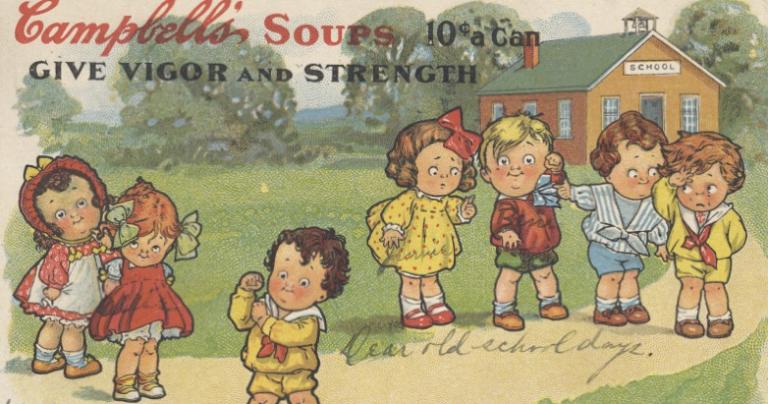 “Mmm-mmm good.” That’s what Campbell’s Soups were: good. At least ads told kids this back when oldsters like I am were kids. If you could get the soup inside you, goodness followed. Soup was not just good, it was beyond words: mmm-mmm.
“Mmm-mmm good.” That’s what Campbell’s Soups were: good. At least ads told kids this back when oldsters like I am were kids. If you could get the soup inside you, goodness followed. Soup was not just good, it was beyond words: mmm-mmm.
In my grandmother’s generation, advertisements told her that Campell’s Soups ingested would give a person vigor and strength for no more than ten cents a can. I ate enough Bean with Bacon Soup to be given great vigor and strength if this had been true. Perhaps the problem is that we were too impatient and ate the soup out of the can without adding water or milk.
Perhaps.
Campbell’s Soups could (perhaps) claim to be good for the body, but the claims of the ad men did not stop with physical health. This red-white-and-canned claimed to be good for the soul! Sadly, there is no amount of Bean with Bacon Soup that can solve the problem of evil. Is there anything that if you could get it inside of you would be good for the soul?
Plato thought so. Virtues were good in themselves in his thinking and not just for any external rewards they might bring. Plato knew that often one does well by doing good, financially or socially. What was special about virtues was not this, being good at games might do the same. Instead, virtues are good for the soul regardless of external outcomes.
Virtue will do a body good, even if nobody else notices, because the good comes from within.
We cannot be sure that we will get treats for being good, but we can become good! Being good is good enough. One goal of The Republic is to prove that at least one virtue, justice, is good just this way. If you can get virtue inside, then your soul becomes just and that is marvelous, magnificent, mighty good.
The best student Socrates ever meets, Glaucon, is still unsure:
As for me, neither the nature of justice or injustice is yet clear. I want to consider both of them quite apart from their effects or the rewards they might bring. What are they in themselves? What power do they exert within the confines of a man’s soul?
Socrates is often accused of a logical philosophy: thinking one must define a thing to know it (the so-called Socratic Fallacy). Ask a child to get a Diet Coke and she might be able to do so without any ability whatsoever to give a robust definition of “Diet Coke” that would separate that Divine beverage from all the pretenders such as Diet Pepsi. Socrates was not guilty. He did not want to clarify what a thing is merely to define it. In this passage, we see why examining a term such as justice can be good for us even if (like Glaucon) we have a sense what a thing is already. Socrates and Glaucon are looking for the nature of justice and what it does by trying to know more about justice.
They are not playing word games. Is justice the sort of thing that does good for the soul internally, because justice is good for its own sake? Is justice the sort of thing that can do no harm? If so, then justice and mercy are not opposed as mercy would be justice applied in a way that minimizes harm to all. Clarifying definitions or the studying the nature of an idea like justice can help us know what to do and how to do it.
Glaucon and Socrates (with all the community listening and sometimes participating) try to see what justice does in a hypothetical city. The two will try to strip away all the prizes justice might rightly earn in a city and see if the just man is still happier (internally) than the unjust man. The unjust man might become King of the city, but is he unhappy? The just man might be crucified for his justice (an example they use), but is he happy internally?
Is there a happiness, a human flourishing, that circumstances cannot take away? Whatever that is, then we should get some of that inside us, be transformed, and made good. Come Lord Jesus!
———————————————-
*I begin an informal summer reading of Republic using Scott/Sterling (a new translation for me). Part 1. Part 2. Part 3. Part 4. Part 5. Part 6. Part 7. Part 8. Part 9. Part 10. Part 11. Part 12. Part 13. Part 14. Part 15. Part 16. Part 17. Part 18. Part 19. Part 20. Part 21. Part 22. Part 23. Part 24. Part 25. Part 26. Part 27. Part 28. Part 29. Part 30. Part 31. Part 32. Part 33. Part 34. Part 35. Part 36. Part 37. Part 38. Part 39. Part 40. Part 41. Part 42. Part 43. Part 44. Part 45. Part 45.5. Part 46. Part 47. Part 48. Part 49. Part 50. Part 51. Part 52. Part 52.5. Part 53. Part 54. Part 55. Part 56. Part 57. Part 58. Part 59. Part 60. Part 61. Part 62. Part 63. Part 64. Part 65. Part 66. Part 67. Part 68. Part 69.












